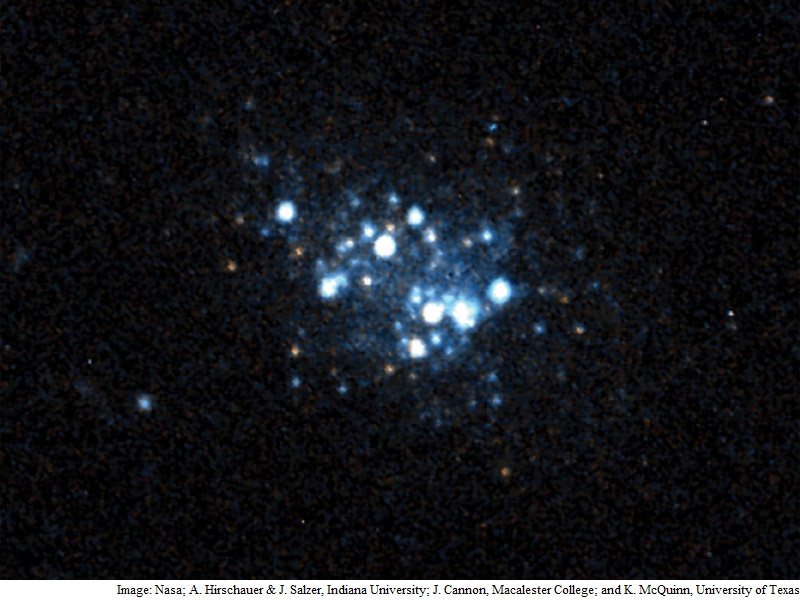- Home
- Science
- Science News
- Faint Blue Galaxy Could Help Shed Light on Birth of Universe: Study
Faint Blue Galaxy Could Help Shed Light on Birth of Universe: Study

Astronomers from Indiana University (IU) found that a galaxy nicknamed Leoncino or "little lion" contains the lowest level of heavy chemical elements or "metals" ever observed in a gravitationally bound system of stars.
"Finding the most metal-poor galaxy ever is exciting since it can help contribute to a quantitative test of the Big Bang," said professor John J. Salzer from IU's Bloomington College of Arts and Sciences.
There are relatively few ways to explore conditions at the birth of the universe, but low-metal galaxies are among the most promising.
This is because the current accepted model of the start of the universe makes clear predictions about the amount of helium and hydrogen present during the Big Bang.
The ratio of these atoms in metal-poor galaxies provides a direct test of the model.
To find these low-metal galaxies, however, astronomers must look far from home.
Our own Milky Way galaxy is a poor source of data due to the high level of heavier elements created over time by "stellar processing," in which stars churn out heavier elements.
"Low metal abundance is essentially a sign that very little stellar activity has taken place compared to most galaxies," added Alec S Hirschauer, graduate student in a paper appeared the Astrophysical Journal.
Leoncino is considered a member of the "local universe," a region of space within about one billion light years from Earth and estimated to contain several million galaxies.
Aside from low levels of heavier elements, Leoncino is unique in several other ways.
A so-called "dwarf galaxy," it's only about 1,000 light years in diameter and composed of several million stars.
The Milky Way, by comparison, contains an estimated 200 billion to 400 billion stars.
"We're eager to continue to explore this mysterious galaxy," Salzer noted.
For the latest tech news and reviews, follow Gadgets 360 on X, Facebook, WhatsApp, Threads and Google News. For the latest videos on gadgets and tech, subscribe to our YouTube channel. If you want to know everything about top influencers, follow our in-house Who'sThat360 on Instagram and YouTube.
Related Stories
- Samsung Galaxy Unpacked 2025
- ChatGPT
- Redmi Note 14 Pro+
- iPhone 16
- Apple Vision Pro
- Oneplus 12
- OnePlus Nord CE 3 Lite 5G
- iPhone 13
- Xiaomi 14 Pro
- Oppo Find N3
- Tecno Spark Go (2023)
- Realme V30
- Best Phones Under 25000
- Samsung Galaxy S24 Series
- Cryptocurrency
- iQoo 12
- Samsung Galaxy S24 Ultra
- Giottus
- Samsung Galaxy Z Flip 5
- Apple 'Scary Fast'
- Housefull 5
- GoPro Hero 12 Black Review
- Invincible Season 2
- JioGlass
- HD Ready TV
- Laptop Under 50000
- Smartwatch Under 10000
- Latest Mobile Phones
- Compare Phones
- Infinix Smart 9 HD
- Lava Yuva Smart
- Samsung Galaxy S25 Ultra
- Samsung Galaxy S25+
- Samsung Galaxy S25
- Realme 14 Pro 5G
- Realme 14 Pro+ 5G
- Itel Zeno 10
- Asus Chromebook CR11
- Lenovo Yoga Slim 9i (2025)
- Asus ROG Flow Z13 (2025)
- Xiaomi Pad 7
- Titan Evolution
- Noise ColorFit Pro 6
- Sony 65 Inches Ultra HD (4K) LED Smart TV (KD-65X74L)
- TCL 55 Inches Ultra HD (4K) LED Smart TV (55C61B)
- Sony PlayStation 5 Pro
- Sony PlayStation 5 Slim Digital Edition
- Blue Star 1.5 Ton 3 Star Inverter Split AC (IC318DNUHC)
- Blue Star 1.5 Ton 3 Star Inverter Split AC (IA318VKU)
















